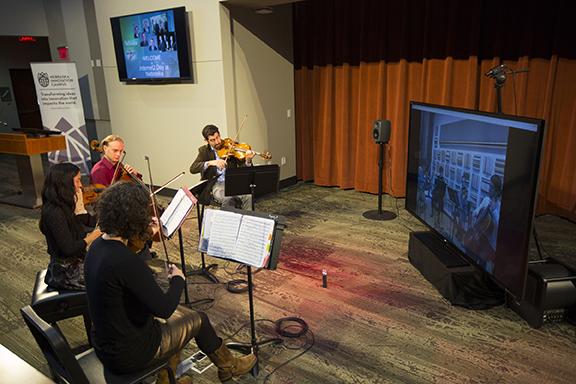
Internet2 Day at Nebraska featured a long-distance musical rehearsal
calendar icon03 Dec 2014
Lincoln, Neb.--A long-distance musical rehearsal between the University of Nebraska–Lincoln’s Chiara String Quartet and Northern Illinois University’s Avalon Quartet highlighted UNL’s Internet2 Day at Nebraska on Nov. 13.A demonstration of low latency audio and video conferencing featured the Chiara String Quartet and Avalon Quartet rehearsing Felix Mendelssohn’s last movement of Octet for Strings via a high-speed connection between Lincoln, Neb., and DeKalb, Ill
Internet2 is a community of U.S. and international leaders in research, academia, industry and government who create and collaborate via innovative technologies. That collaboration accelerates research discovery, advances national and global education and improves the delivery of public services.
“This demonstration of live music collaboration over vast distances utilizing Internet2 and LOLA (low latency systems) was a huge success and far exceeded our most optimistic hopes for it,” said John W. Richmond, Director of the Glenn Korff School of Music at UNL. “This was due, in part, to the efforts of so many at UNL, NIU and Internet2 to find and eliminate causes of latency and static in the connections between UNL and NIU, and also a real testament to the deep musicality and remarkable collegiality of the members of both the Avalon and Chiara String Quartets. I could not have been more thrilled with the ‘live rehearsal’ and the marvelous questions and conversations that it prompted during our Internet2 Day Conference.”
Jonah Sirota, Research Associate Professor and member of the Chiara String Quartet said the demonstration provided insight into what might be possible.
“We chose the last movement of Mendelssohn’s Octet for Strings because it begins like a round, with every player entering in order from the lowest cello of the group on,” he said. “A standard internet connection simply isn’t fast enough to support a collaborative musical connection like this in real time. But with UNL and NIU’s Internet2 pipeline, it was a good experiment in what’s possible and showed the potential of the technology.”
On Nov. 13, the latency rate on the line between UNL and NIU was reduced to 19 milliseconds, or 19/1000 of a second. Just two days earlier during a rehearsal for the conference, the rate was above 50 milliseconds.
“It wasn’t quite where we would need it to be to work at our highest professional level and the work that we do,” Sirota said. “But it was certainly an eye-opening demonstration of what could be available to us in the future, and that was very inspiring.”
Ann Doyle, community engagement manager for Internet2, was pleased with the demonstration.
“To be able to see musicians playing together when for so many years I’ve always had to say it can’t be done—it’s just extraordinary and an incredible breakthrough,” she said. “And for me, it’s just really exciting to see. It wasn’t perfect, but it was a remarkable breakthrough.”
Richmond said this technology presents exciting opportunities in the future.
“The opportunity for musicians separated by vast distances to collaborate more than occasionally has been made impossible by the costs of time and travel to come together for this purpose,” Richmond said. “Technologies have been insufficient until very recently to bridge these challenges. As latency decreases and reliability increases, the possibility of real-time musical collaboration, first for rehearsal, as we witnessed on Nov. 13, and later for even more demanding applications, will be possible.
“These advancements will provide for the first time in history an authentic opportunity for the discipline of music to enjoy many of the advancements and economic benefits that other academic disciplines, with less exacting technological needs, now take for granted. The Glenn Korff School of Music has been and will continue to be a champion and enthusiastic collaborator on these important initiatives.”
More news from:
Hixson-Lied College of Fine and Performing Arts